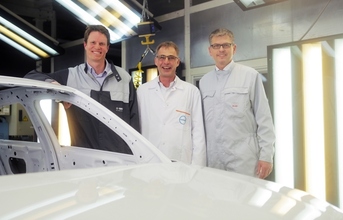
In the automotive industry, manufacturers and suppliers are working constantly to reduce energy consumption and CO2 emissions in production. A project team consisting of employees of the car maker Audi, BASF´s Coatings division and materials company Covestro has passed a new milestone: for the first time, a clearcoat containing a bio-based hardener was applied to test bodies of the Audi Q2 under near-series conditions at the Audi plant in Ingolstadt, Germany.
BASF developed the clearcoat using the biobased hardener Desmodur eco N 7300 from Covestro. A total of 70 percent of the hardener's carbon content is sourced from renewable raw materials. This innovation reduces the consumption of fossil resources. The clearcoat forms the top layer of the coating system, lending it scratch resistance, a glossy appearance and protection against sunlight and other weather effects.
Improved eco-balance, high quality
"Our new clearcoat helps our customers to reach their sustainability targets, without having to compromise in terms of quality and performance," says Dr. Matthijs Groenewolt, head of clearcoat and topcoat development Europe at BASF.
Dr. Markus Mechtel, head of marketing for automotive coatings at Covestro, adds: "Using renewable raw materials in the production of bio-based hardeners helps to conserve fossil resources. At the same time, the biomass, as it grows, captures CO2 in the environment." In addition, process steps are eliminated during bio-based raw material production for this hardener, thus leading to an additional reduction of CO2 emissions.


























